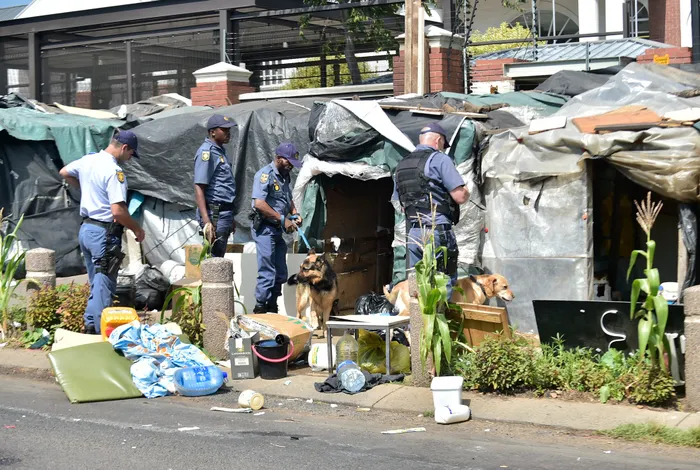About 300 refugees, children evicted from United Nations office in Pretoria

Refugees who have been camped outside the UN High Commission for Refugees in Brooklyn, Pretoria are evicted by the police. Picture: Thobile Mathonsi/African News Agency (ANA)
Pretoria - Since 2019, 50-year-old Justine Zaina from the Democratic Republic of Congo has been living in a shelter built with plastic and wood on the pavement outside the UN High Commission for Refugees (UNHCR) in Brooklyn, Pretoria.
Yesterday, Zaina was forced to walk away from a place she called home for four years.
Together with more than 300 other refugees and their children who set up the shelters, Zaina had settled at the place and grown mealies on the pavements.
Their stay there was ended when the SAPS officers descended on the place in the morning to execute a court order by Gauteng High Court, Pretoria that they be removed and taken to Lindela Repatriation Centre in Krugersdorp, for now.
Foreign nationals who have been camping outside the UN High Commission for Refugees offices in Brooklyn were on Friday overwhelmed with frustration and hopelessness when they were forcefully removed by the SAPS #Refugees @SAPS #UnitedNations @CityTshwane pic.twitter.com/a2lAOVRhXT
— Pretoria News (@pretorianews) April 21, 2023
Overwhelmed with frustration and hopelessness, the refugees packed their belongings, which included mattresses, blankets, clothes, food and pots.
Many, however, refused to be transported to Lindela despite being stranded following the eviction.
They told the Pretoria News that they didn’t know where to go, but that God would provide them with alternative place to stay.
On many occasions, they have refused to relocate from the premises, claiming they didn't want to reside among South Africans for fear of xenophobic attacks.
They said relocating to Lindela was not an option because of the inhuman treatment at the facility.
Foreign nationals who have been camping outside the UN High Commission for Refugees offices in Brooklyn were on Friday overwhelmed with frustration and hopelessness when they were forcefully removed by the SAPS #Refugees @SAPS #UnitedNations @CityTshwane pic.twitter.com/Un6cw6TB9O
— Pretoria News (@pretorianews) April 21, 2023
For years the foreigners have been resisting to vacate the premises, sparking security concerns among residents of Brooklyn and Waterkloof.
The residents associations of the two areas were part of legal action against the foreign nationals on the grounds that they felt unprotected by the City of Tshwane.
In reaction to a huge presence of SAPS officers, Zaina said: “We are not the criminal. What have we done in this country?
“God knows that the Congolese are faced with hardships in their country and he opened a way for them to go where they feel there is peace. If they want to kill me, they can kill me because I have already died.”
Lawyers for Human Rights representative Louis du Plessis speaks about the foreign nationals who have been forcefully removed by the SAPS after camping outside the UN High Commission for Refugees in Brooklyn #Refugees #HumanRights #UnitedNations #SAPS pic.twitter.com/U42GTfRZDH
— Pretoria News (@pretorianews) April 21, 2023
She scoffed at suggestions that they must be integrated into local communities.
“Which community they don't want us to go to? Before we came here, we were from Lindela. We came here because we knew that UN Refugees Centre is our father; it is a place for refugees and to protect them.
“We came here because were experiencing xenophobia. We are not in the street; we are inside the place of UN Refugees Centre,” she said.
Another refugee, who did not want to give her name, said: “My daughter was born in South Africa in 2010. At some stage we were taken to Lindela and it was bad. Do you think I can take my daughter there again? In SA, the government is only for locals and it doesn't want to take care of us.”
Another, also without giving her name, said: “God is going to take care of us. We don't know where we are going, but we are going.”
Foreign nationals who have been camping outside the UN High Commission for Refugees offices in Brooklyn were on Friday overwhelmed with frustration and hopelessness when they were forcefully removed by the SAPS #Refugees @SAPS #UnitedNations @CityTshwane pic.twitter.com/99FjMNGSBe
— Pretoria News (@pretorianews) April 21, 2023
Lawyers for Human Rights representative Louis du Plessis said many foreign nationals didn’t want legal representation.
“We are trying to talk to churches to see if they are going to accommodate them. They don't have a place to go to. They are just hitting the road now because they are saying Lindela is a hell hole that they don't want to go to because many of them have been there for three years. They would rather stay here on the pavement than stay in Lindela,” she said.
Tshwane mayor Cilliers Brink said the metro had to apply the laws of the country by making sure that there was peace and order.
“There is accommodation for asylum seekers, and unfortunately if you don’t like the quality of the facility it is a separate issue. At the same time, the City of Tshwane has to apply the laws of the country and we have to make sure that there is law and order,” Brink said.

Pretoria News